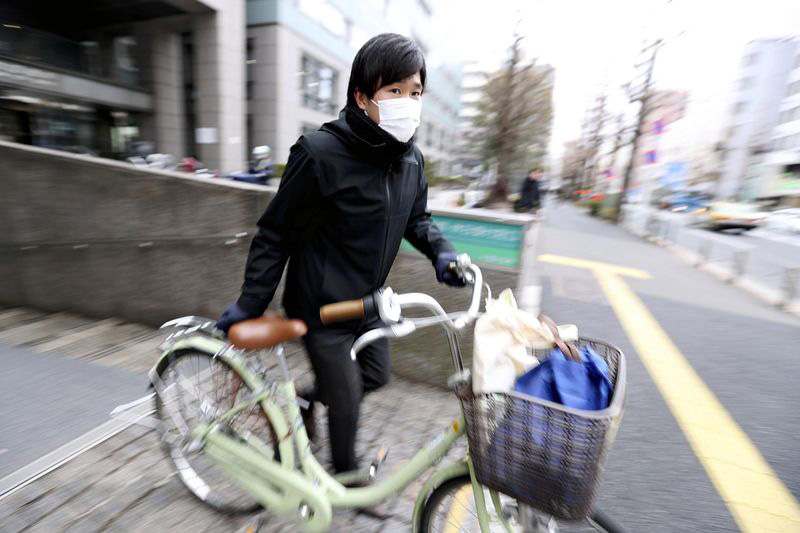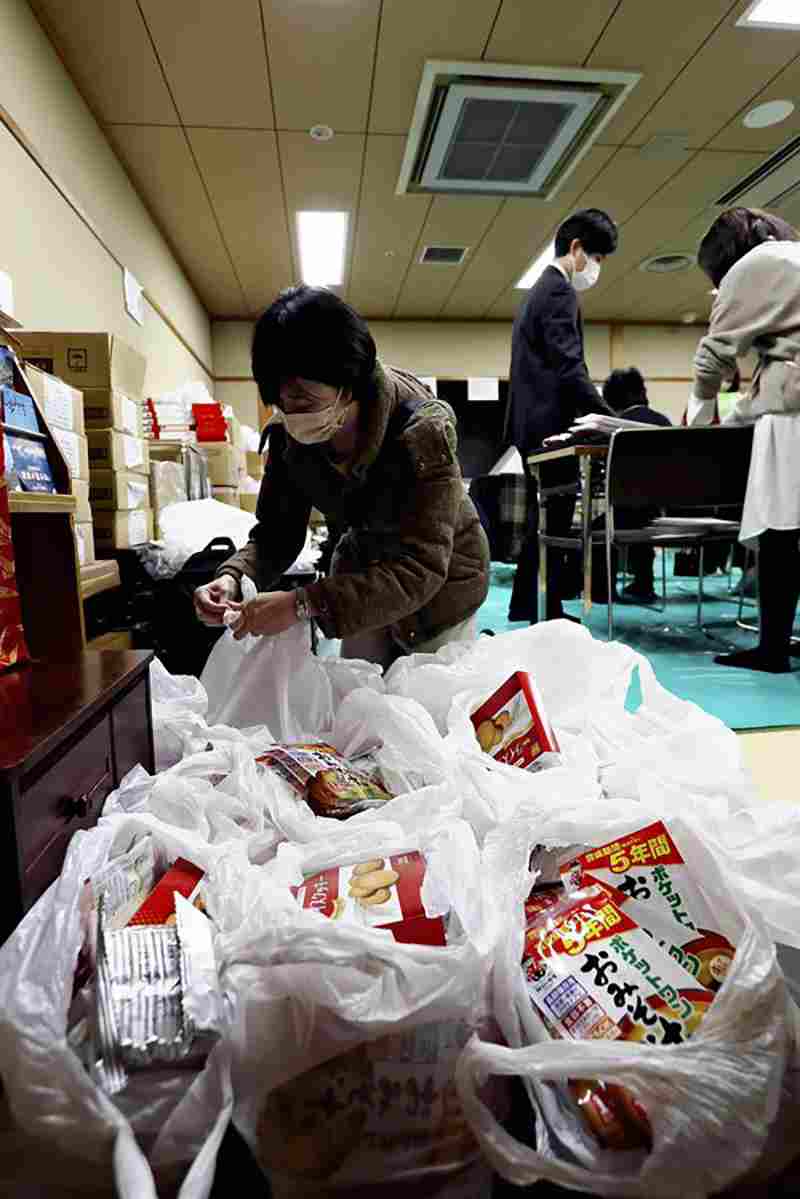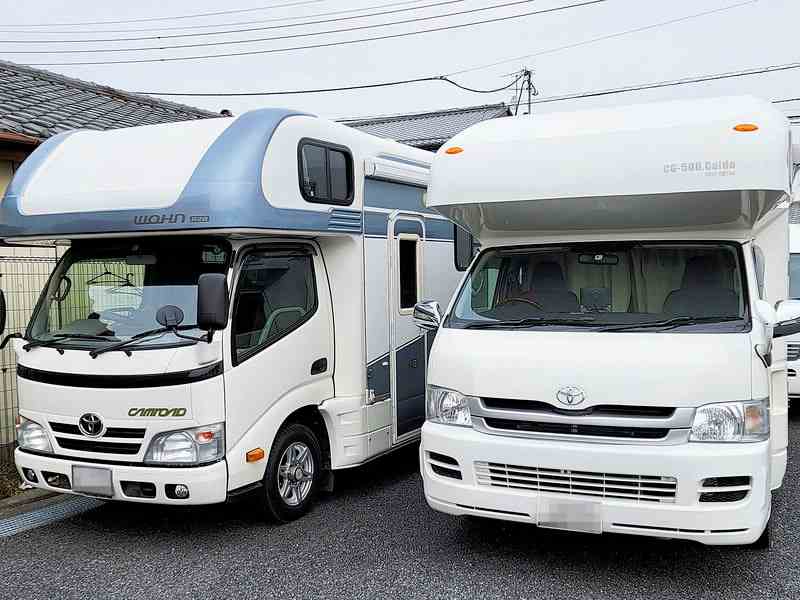
A staff member of Tokyo’s Suginami Ward government prepares to deliver goods to COVID-19 patients staying at home on Jan. 26.
13:09 JST, February 10, 2022
As the sixth wave of the coronavirus pandemic continues, local governments are taking a variety of measures to help people recuperating at home.
Due to the spread of the highly contagious omicron variant, the number of COVID-19 patients staying at home topped 350,000 in late January, far exceeding the 130,000 cases during the peak of the fifth wave. Local governments are scraping together the manpower to deliver emergency food by bicycle and lending out motor homes to those who need to isolate from family members, as infections are expected to spread within households.
Museum, tax staff pitch in
On the morning of Jan. 26, staff members of what has been dubbed the “home care station delivery team” at Tokyo’s Suginami Ward government set out with emergency food in the front baskets of their bicycles. They were delivering it to COVID-19 patients staying at home near the ward office.

A staff member of the Suginami Ward government packs food into bags on Jan. 26.
Since the pandemic started in the spring of 2020, the ward government has been delivering emergency food supplies to people staying at home who don’t have enough stocked up.
Up until the fifth wave, the food was delivered using two of its official vehicles. However, these two vehicles could no longer keep up with the growing demand, prompting the ward to hire two cars. But even four vehicles in full operation failed to meet the need, and in mid-January staff members began to make deliveries by bicycle.
Delivery personnel were hastily recruited from various divisions, ranging from the ward-run museum to the taxation section.
Hidenori Watanabe, the chief of the health-promotion section in the ward’s public health center, supervises the assistance. “Although it’s a patchwork team, the members are working as a single body, eager to extend whatever support they can,” he said.
The team’s base is in a tearoom on the first basement level of the ward government office. Inside a traditional 20-tatami-mat room, there are piles of retort-pouch foods, including rice porridge, as well as freeze-dried miso soup and cookies.
About 3,000 patients are currently staying at home in Suginami Ward, nearly three times as many as during the peak of the fifth wave last August, when there were about such 1,100 people.
Recently, about 100 deliveries have been needed each day. “We’re running out of the food supplies we had stored for emergencies. We have to contrive ways to continue our assistance,” Watanabe said.
Communities pull together
The municipal government of Bunkyo Ward, Tokyo, started a delivery project on Jan. 21 to help elderly people who are unfamiliar with online shopping. Local drugstores, stationery shops and the like cooperate in the project by accepting orders via phone or fax.
The ward government pays each store a fee of ¥500 per delivery and the goods are placed at the entrance of the home that placed the order, to avoid infections. Customers will pay the stores after their isolation period is over.
Hiroo Honda, the 82-year-old proprietor of a liquor store, decided to get involved in the project. “The number of infected people has been rising rapidly, so it’s no longer just ‘someone else’s problem,’” he said. “I hope I can help people who can’t get out of doors, in whatever small way I can.”
There are now 10 stores taking part in the initiative, and the ward office plans to increase this number.
“By using the power of our local communities, we want to prevent those staying at home from being isolated,” a ward official said.
Lending out motor homes
A service to lend out motor homes, run by the city government of Fukaya, Saitama Prefecture, has seen demand rise sharply due to concern about infections spreading within families.
The service allows an infected family member to self-isolate in a motor home in their home’s parking spot or other locations.

The city government of Fukaya, Saitama Prefecture, lends out these motor homes to patients staying at home. The photo has been partially modified.
The city government inked a contract with a car rental company to rent three motor homes last October. Although none of the motor homes were used in 2021, residents rushed to apply for them this year, prompting the local government to rent another vehicle on Jan. 27. It also plans to rent one more motor home in the future.
According to the city’s social welfare council, which is entrusted with carrying out the service, many who use the motor homes say they have a student preparing for an entrance exam, or they have small children at home.
The official in charge said: “By using a motor home, a person can live close to their family while still properly isolated. If there’s more demand for the service, we will consider further increasing the number of motor homes.”
Top Articles in Society
-

Man Infected with Measles Reportedly Dined at Restaurant in Tokyo Station
-

Man Infected with Measles May Have Come in Contact with Many People in Tokyo, Went to Store, Restaurant Around When Symptoms Emerged
-

Woman with Measles Visited Hospital in Tokyo Multiple Times Before Being Diagnosed with Disease
-

Australian Woman Dies After Mishap on Ski Lift in Nagano Prefecture
-

Foreign Snowboarder in Serious Condition After Hanging in Midair from Chairlift in Nagano Prefecture
JN ACCESS RANKING
-

Japan PM Takaichi’s Cabinet Resigns en Masse
-

Japan Institute to Use Domestic Commercial Optical Lattice Clock to Set Japan Standard Time
-

Israeli Ambassador to Japan Speaks about Japan’s Role in the Reconstruction of Gaza
-

Man Infected with Measles Reportedly Dined at Restaurant in Tokyo Station
-

Videos Plagiarized, Reposted with False Subtitles Claiming ‘Ryukyu Belongs to China’; Anti-China False Information Also Posted in Japan























